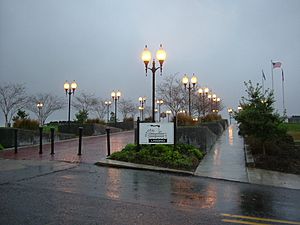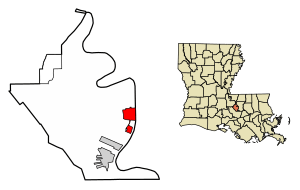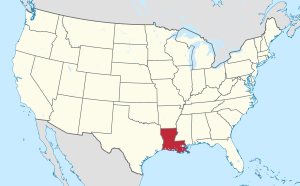Port Allen, Louisiana facts for kids
Quick facts for kids
Port Allen
|
|
|---|---|
| City of Port Allen | |

The Old Ferry Landing at Port Allen
|
|

Location of Port Allen in West Baton Rouge Parish, Louisiana.
|
|

Location of Louisiana in the United States
|
|
| Country | United States |
| State | Louisiana |
| Parish | West Baton Rouge |
| Incorporated | 1916 |
| Named for | Henry Watkins Allen |
| Area | |
| • Total | 3.33 sq mi (8.62 km2) |
| • Land | 2.83 sq mi (7.34 km2) |
| • Water | 0.49 sq mi (1.28 km2) |
| Elevation | 26 ft (8 m) |
| Population
(2020)
|
|
| • Total | 4,939 |
| • Density | 1,742.15/sq mi (672.66/km2) |
| Time zone | UTC-6 (CST) |
| • Summer (DST) | UTC-5 (CDT) |
| ZIP Code |
70767
|
| Area code(s) | 225 |
| FIPS code | 22-61790 |
| Website | www.portallen.org |
Port Allen is a city in, and the parish seat of, West Baton Rouge Parish, Louisiana, United States. Located on the west bank of the Mississippi River, it is bordered by Interstate 10 and US Highway 190. The population was 5,180 at the 2010 census, down from 5,278 in 2000. It is part of the Baton Rouge Metropolitan Statistical Area.
Port Allen is home to the Mississippi Riverfront Development, which provides a panoramic view of the Mississippi River and Baton Rouge, the West Baton Rouge Museum, the City of Port Allen Railroad Depot, Scott's Cemetery, the Port of Greater Baton Rouge, and the Port Allen Lock.
Contents
Registered Historical Places
The registered historical places in Port Allen include: Aillet House, Allendale Plantation Historic District, Cohn High School, Monte Vista Plantation House, Poplar Grove Plantation House, Port Allen Middle School, Sandbar Plantation House, and the Smithfield Plantation House.
Festivals
Port Allen Festivals include the Lagniappe Dulcimer Fete Festival, Port Allen Bonfires on the Mississippi River, SugarFest, West Baton Rouge Parish Fair, and the Oldies but Goodies Fest.
Attractions
The West Baton Rouge Museum includes the museum, the c. 1830 Aillet House, a c. 1870s Reconstruction Era worker's cabin, and a c. 1890s cabin decorated to look as it would have during the Civil Rights Era), the c. 1880s Arbroth Plantation Store, the c. 1938 Reed Farm and Ranch Shotgun House, and a reproduction early 20th century barn.
The City of Port Allen Railroad Depot is a museum depicting the life of railroad workers in the 1940s. It includes a ticket booth, clothing and memorabilia from that era, along with the typewriter originally used at the depot. The 1950 caboose, which is also open for tours, is the only one in Louisiana that is almost totally restored to its original condition.
The Mississippi Riverfront Development offers a panoramic view of the Mighty Mississippi and Baton Rouge. The area includes a pedestrian promenade with special architectural paving, viewing benches, and ornamental street lighting. On this site a ferry operated between Port Allen and Baton Rouge from 1820 to 1968.
Scott’s Cemetery is the burial place of African Americans in West Baton Rouge's history and dates back to the 1850s. It is located at the corner of Court and Commerce Streets near the Riverfront Development.
The Port of Greater Baton Rouge, located in Port Allen, is the head of deepwater navigation on the Mississippi River, serving barges and ocean-going vessels with international import and export facilities for all types of cargo, from grain to paper products, chemicals, manufactured goods, bulk ores and petroleum products. It is one of the top ten ports in the country. It handles roughly 61 million short tons of cargo each year, has 3,000 feet (910 m) of dock and 550,000 square feet (51,000 m2) of warehouse space. Its facilities include grain elevator storage, molasses, sugar, oil and coffee terminals.
The Port Allen Lock connects the Mississippi River to the Gulf Intracoastal Waterway, shortening the distance to the Gulf of Mexico by approximately 120 miles (190 km). The Lock, a free-floating structure is the largest of its kind, as it serves as a man-made break in the levee. The massive structure has 90-ton doors and 64 feet (20 m) sides. The lock was constructed in 1961 by the U.S. Army Corps of Engineers to replace the historic Plaquemine Lock. The Intracoastal Waterway is an east-west inland waterway shortcut that connects Florida and Texas, eliminating 130 miles (210 km) of shipping distance.
Geography
Port Allen is located at 30°27′13″N 91°12′36″W / 30.45361°N 91.21000°W (30.453740, -91.209957).
According to the United States Census Bureau, the city has a total area of 2.6 square miles (6.8 km²), of which, 2.1 square miles (5.5 km²) of it is land and 0.5 square miles (1.3 km²) of it (19.39%) is water. The city is adjacent to the Mississippi River which passes to the east side of the city.
Demographics
| Historical population | |||
|---|---|---|---|
| Census | Pop. | %± | |
| 1920 | 920 | — | |
| 1930 | 1,524 | 65.7% | |
| 1940 | 1,898 | 24.5% | |
| 1950 | 3,097 | 63.2% | |
| 1960 | 5,026 | 62.3% | |
| 1970 | 5,728 | 14.0% | |
| 1980 | 6,114 | 6.7% | |
| 1990 | 6,277 | 2.7% | |
| 2000 | 5,278 | −15.9% | |
| 2010 | 5,180 | −1.9% | |
| 2020 | 4,939 | −4.7% | |
| U.S. Decennial Census 2011 estimate |
|||
2020 census
| Race | Number | Percentage |
|---|---|---|
| White (non-Hispanic) | 1,660 | 33.61% |
| Black or African American (non-Hispanic) | 2,952 | 59.77% |
| Native American | 17 | 0.34% |
| Asian | 20 | 0.4% |
| Pacific Islander | 1 | 0.02% |
| Other/Mixed | 147 | 2.98% |
| Hispanic or Latino | 152 | 2.88% |
As of the 2020 United States census, there were 4,939 people, 2,097 households, and 1,343 families residing in the city.
Education
West Baton Rouge Parish School Board operates area public schools.
Holy Family School (of the Roman Catholic Diocese of Baton Rouge) is a local private Catholic school for grades pre-K through Eight. It opened on September 5, 1949 with 146 students in Kindergarten through grade 3, with it becoming K-5 in 1950, and with one grade level per subsequent year until it was K-8, with 345 students, in 1953. Its current grade 4-8 building opened in 1961 and its library opened in 1990.
It is in the service area of Baton Rouge Community College.
Notable people
- Henry Watkins Allen,, slave owner.planter.
- Tracy Porter, formerly a cornerback for the Chicago Bears, who played for the New Orleans Saints in 2009. In the aftermath of the Super Bowl win, Port Allen first jokingly renamed the city "Porter Allen" for a day in Porter's honor.
- Arthur T. Prescott, educator who was founding president of Louisiana Tech University in 1894, taught school in Port Allen from 1883 to 1884.
- Harry Brown, the first African-American elected police chief of Port Allen. *Johnathan Johnson,Former LSU track and field sprinter,
Images for kids
See also
 In Spanish: Port Allen (Luisiana) para niños
In Spanish: Port Allen (Luisiana) para niños


